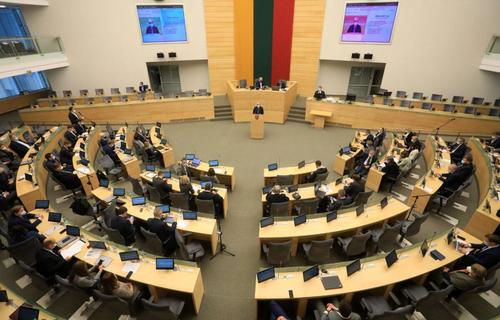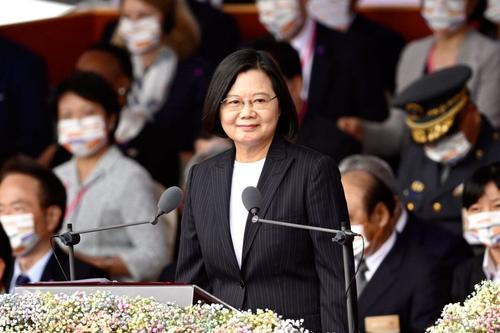(Ce que l'UE reproche à la Chine est ce que font les USA ou plutôt l'oligarchie américaine en pire depuis des décennies. Et dire que ce qui est bon pour la finance et les multinationales américaines est bon pour le pays, c'est vite oublier que ce n'est pas bon pour le peuple américian, vu le niveau de misère qui règne dans le pays. note de rené)
Lithuania Withdraws From China's "17+1" Cooperation Platform
Authored by Frank Fang via The Epoch Times,
The Lithuanian government has pulled out of Beijing’s “17+1” platform, a Chinese initiative that the Baltic nation signed up to in 2012.
The Chinese regime officially launched the platform—which was initially named the “16+1” platform—in April 2012 to intensify cooperation with 11 European Union member states and five Balkan countries. The platform was renamed “17+1” after Greece signed up for the initiative in April 2019.
The initiative calls for participating countries to cooperate with China in many fields, including finance, health, trade, and technology. Modeled after the platform, Beijing rolled out another project in 2013, which is called the “Belt and Road Initiative” (BRI, also known as “One Belt, One Road), in an effort to build up trade routes linking China and other parts of the world.
On May 22, Lithuanian Foreign Minister Gabrielius Landsbergis said in a statement that the Baltic nation does not see itself as a “17+1” member any more and will not participate in the initiative’s activities, according to the Baltic News Service.
Landsbergis added that the Chinese platform was “divisive” from the EU’s point of view. He called on EU members to pursue “a much more effective 27+1 approach and communication with China.”
“Europe’s strength and impact is in its unity,” Landsbergis added. Currently, there are 27 member countries in the EU after the UK left the political and trading bloc in January 2020.
Lithuania’s decision to pull out of the Chinese platform was not unexpected. In March, Landsbergis told German newspaper Frankfurter Allgemeine Zeitung that the “17+1” platform had fallen short of their expectations, in particular about investments that served mutual interests.
Taking part in the platform also came with negative consequences. Landsbergis explained to the German paper, “This format was accompanied by divisive tendencies in the EU and greater political pressure from China.”
Lithuania’s Homeland Union and Lithuanian Christian Democrats party leader Ingrida Simonyte delivers her speech at the parliament in Vilnius, Lithuania, on Nov. 24, 2020. (Petras Malukas/AFP via Getty Images)
Xinjiang and Taiwan
Lithuania’s move is the latest indication of a souring tie between the two countries.
On May 20, the Lithuanian parliament passed a non-binding resolution, condemning Beijing’s treatment of the Uyghur minority in China’s far-western region of Xinjiang as “genocide.” The resolution was passed by 86 to one vote and seven abstentions.
In Xinjiang, which is home to about 11 million Uyghurs, at least 1 million Uyghurs, Kazakhs, and Kyrgyz have been detained in internment camps for political indoctrination.
Parliaments in Canada, the Netherlands, and the UK have passed similar resolutions. In January, then-U.S. Secretary of State Mike Pompeo declared that the Chinese Communist Party (CCP) has committed “genocide” and “crimes against humanity” against Uyghurs and other minorities in Xinjiang.
The Lithuanian resolution also called on the CCP to “immediately end the illegal practice of organ harvesting from prisoners of conscience, release all prisoners of conscience in China, including members of the Falun Gong.”
In response to the resolution, the Chinese Embassy in Lithuania slammed the Lithuanian parliament for a “shoddy political show based on lies and disinformation” in a statement released on May 20.
Beijing also reacted angrily when Lithuania voiced support for Taiwan, a de-facto independent country that Beijing claims is a part of its territory. In November 2020, the Lithuanian government stated that it was committed to supporting “those fighting for freedom” around the world including Taiwan.
The public support for Taiwan drew the ire of Hu Xijin, the editor-in-chief of China’s hawkish mouthpiece Global Times. In his opinion article published days later, Hu demanded the Lithuanian government “to behave” with regards to Taiwan issues.
“If the government in Vilnius [Lithuania’s capital] continues to behave crazily, it is bound to suffer consequences,” Hu threatened.
Taiwan and Lithuania are not formal diplomatic allies but officials from the Baltic nation have voiced support for the self-ruled island to take part in the World Health Organization (WHO). Taiwan is not a member of the WHO due to Beijing’s opposition.
In March, Lithuania stated it wanted to advance ties with Taiwan by setting up a representative office on the island.
Taiwan President Tsai Ing-wen speaks during National Day celebrations in front of the Presidential Office Building in Taipei on Oct. 10, 2020. (Sam Yeh/AFP via Getty Images)
Espionage
Lithuania has also previously warned about China’s increasing intelligence activities inside the Baltic nation.
“From Lithuanian citizens, Chinese intelligence may seek to obtain sensitive or classified national or NATO and EU information,” stated Lithuania’s 2019 National Threat Assessment report, according to the Estonian newspaper The Baltic Times.
“Chinese intelligence-funded trips to China are used to recruit Lithuanian citizens.”
The report was put together by Lithuania’s State Security Department and the Second Investigation Department under the country’s Defense Ministry. It named two Chinese agencies—the Ministry of State Security, China’s chief intelligence agency, and the Military Intelligence Directorate of China’s People’s Liberation Army—for their increasing operations in Lithuania.
“Chinese intelligence looks for suitable targets—decision-makers, other individuals sympathizing with China and able to exert political leverage. They seek to influence such individuals by giving gifts, paying for trips to China, covering expenses of training and courses organized there,” the report stated.
Some of the particular interests to Chinese intelligence officials included Lithuania’s domestic and foreign policies, as well as the country’s economy and defense sector.



Aucun commentaire:
Enregistrer un commentaire